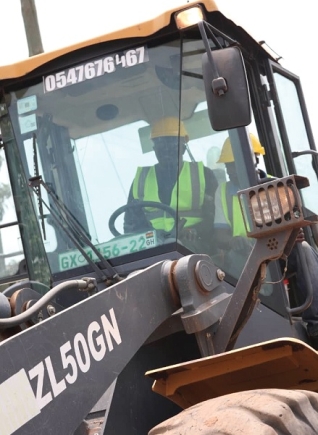
The Minister of Food and Agriculture, Dr Bryan Acheampong, has cut the sod for work to begin on some infrastructural projects to boost agriculture and improve market access in the country.
The GH¢35 million projects, which include the construction of farm tracks (roads), water harvesting schemes and drying platforms, and boreholes, are under the emergency support to rural livelihoods and food systems exposed to COVID-19 (ESRF).
They are being funded with a loan from the International Fund for Agricultural Development (IFAD).
Dr Acheampong, who did the launch at Kwasi Fante in the Afram Plains South District in the Eastern Region, said the projects would ultimately facilitate the smooth implementation of the Planting for Food and Jobs Phase Two (PFJ2.0) programme.
The intervention is aimed at enhancing livelihoods of farmers by providing them with better access to markets, increase crop yields, address water scarcity and improve post-harvest management.
Also, 100 hectares of water harvesting schemes would be constructed for farmers at Tordzinu in South Tongu and Klenormadi in the Ketu districts in the Volta Region.
Sixteen commodity drying platforms would also be built and 29.5 kilometres of farm tracks constructed in various regions.
In addition, 20 boreholes would be constructed in the North-East Gonja, Nanton, and Atebubu in the Bono East, as well as the Northern and Savannah regions.

Dr Bryan Acheampong performing the groundbreaking ceremony for commencement of the project
The minister urged contractors working on the projects to adhere to standards and ensure that the projects were not only carried out to specification, but also completed on schedule.
In line with that, Dr Acheampong charged the supervising agencies such as the Ghana Irrigation Development Authority (GIDA), the Department of Feeder Roads (DFR) and the Community Water and Sanitation Agency (CWSA) to ensure that the works were executed to perfection.
“These agencies need to provide effective supervision to ensure that contractors adhere to agreed-upon specifications.
“Continuous monitoring of the projects and the prompt resolution of challenges are essential for its successful execution,” he added.
The minister also called for the active participation of beneficiary communities, saying “while we are committed to providing the necessary infrastructure, it is equally important for communities to maintain and also ensure the efficient use of facilities for their benefit”.
He expressed appreciation to IFAD for the support and entreated other development partners to collaborate with the ministry to improve agricultural practices in the country to ensure food security and also better the lives of the people.
The ESRF Programme Coordinator, Dr Hayford Baah-Adade, further explained that the projects would support smallholder farmers and beneficiary communities impacted by the COVID-19 pandemic and climate change.
He said contractors for the projects were selected based on their expertise and track record in delivering infrastructural works.
Dr Hayford said that the projects consisted of three components - protection against hunger and building resilient livelihoods; safeguarding rural marketing linkages and food security; and project management, monitoring and evaluation.